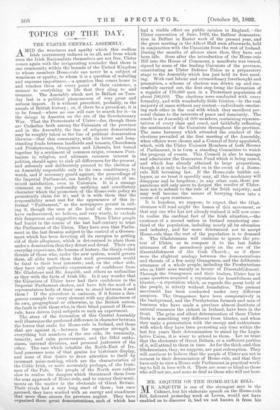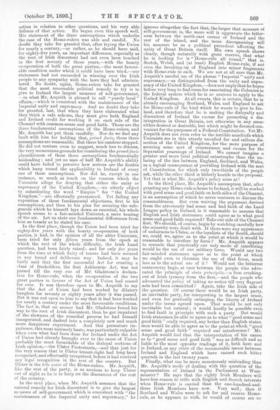MR. ASQUITH ON THE HOME-RULE BILL.
MR. ASQUITH is one of the strongest men in the Cabinet, but his elaborate speech on the Home-rule Bill, delivered yesterday week at Leven, would not have enabled us to discover it, had we not known it from his action in relation to other questions, and his very able defence of that action. He began even this speech well. His statement of the three assumptions which underlie the case of the Home-rulers was able and candid. No doubt they take for granted that, after trying the Union for nearly a century,—or rather, as he should have said, for eighty-five years, an important difference, especially as the root of Irish discontent had not even been touched in the first seventy of those years,—with the hearty co-operation of both the great parties,—the most favour- able condition under which it could have been tried,—our statesmen had not succeeded in winning over the Irish people to any sympathy with the laws they had adminis- tered. No doubt, again, Home-rulers take for granted that the most reasonable political remedy to try is to give to Ireland the largest measure of self-government, —in what Mr. Asquith is pleased to call "purely local" affairs,—which is consistent with the maintenance of the Imperial unity and supremacy. And no doubt they take for granted, last, that when they have elaborated what they think a safe scheme, they must give both England and Ireland credit for working it on each side of the Channel with common-sense and good faith. Those are the three fundamental assumptions of the Home-rulers, and Mr. Asquith has put them candidly. Nor do we find any fault with him for holding that, prima' facie, these three assumptions are reasonable. But there his candour stopped. He did not venture even to suggest, much less to discuss, the very momentous grounds for considering the prima facie plausibleness of these three assumptions fundamentally misleading ; and yet no man of half Mr. Asquith's ability could have failed to perceive how serious are the doubts which hang round the applicability to Ireland of every one of these assumptions. Nor did he, except in one instance, so much as touch on the reasons which the Unionists allege for denying that either the unity or supremacy of the United Kingdom,—we utterly object to substituting the word " Empire " for "the United Kingdom,"—are effectually guaranteed. Yet failing any exposition of these fundamental objections, first to his assumptions, and then to his plan for securing the safe- guards which he himself lays down as essential, his whole speech seems to a fair-minded Unionist, a mere beating of the air. Let us state our fundamental differences from him as tersely as he stated his case.
In the first place, though the Union had been tried for eighty-five years with the hearty co-operation of both parties, it had, in the opinion of all the abler Unionists, been tried for only fifteen years from the epoch at which the root of the whole difficulty, the Irish Land question, had been fairly raised; and for only five years from the time at which fixity of tenure bad been secured in any broad and deliberate way. Indeed, it may be fairly said that the first successful Act for creating a class of freeholders, the first Ashbourne Act, was not passed till the very eve of Mr: Gladstone's declara- tion for Home-rule, when the co-operation of the two great parties in favour of the Act of Union had ceased for ever. It was therefore open to Mr. Asquith to say that the Act of Union had been worked by dilatory bunglers for seventy or eighty years after it was passed. But it was not open to him to say that it had been worked for nearly a century under the most favourable conditions. The fact is, that no sooner had Mr. Gladstone found his way to the root of Irish discontent, than he got impatient of the slowness of the remedial process he had himself inaugurated, and dashed into a completely new and much more dangerous experiment. And this premature im- patience, this most untimely haste, was particularly culpable when even what had been done for Ireland under the Act of Union had already brought over to the cause of -Union probably the most formidable of the disloyal sections of Irish opinion,—the Ulster Protestants,—and that just for the very reason that in Ulster tenant-right had long been recognised, and effectually recognised, before it had received any legal recognition in the rest of the country. But Ulster is the be noire of the Home-rulers. Mr. Asquith, like the rest of the party, is as anxious to keep Ulster out of sight as he is to harp on the discontent of the rest of the country. In -the next place, when Mr. Asquith assumes that the natural remedy for Irish discontent is to give the largest measure of self-government which is consistent with "the maintenance of the Imperial unity and supremacy," he ignores altogether the fact that, the larger that measure of self-government is, the more will it aggravate the bitter- ness between the north-east corner of Ireland and the rest of the island, and the more disorganising will his measure be as a political precedent affecting the unity of Great Britain itself. His own speech shows clearly, though naturally with great reserve, that what he is looking for is "Home-rule all round," that is Scotch, Welsh, and (at least) English Home-rule, if not even the breaking-up of England into minor fragments with Home-rule in each. We are not at all sure that Mr. Asquith's careful use of the phrase " Imperial " unity and supremacy,—as distinguished from the unity and supre- macy of the United Kingdom,—does not imply that he hopes before very long to find room for associating the Colonies in the federal system which he is so anxious to apply to the United Kingdom. At all events, this is certain, that he is already encouraging Scotland, Wales, and England to ask. for Home-rule of the kind which he wants to give to Ire- land, and therefore that he is making the disloyalty and discontent of Ireland the excuse for promoting a dis- integration in Great Britain, not otherwise in any sense- either desired or desirable, but which might be deemed con- venient for the purposes of a Federal Constitution. Yet Mr. Asquith does not even refer to the terrible mischiefs which Unionists see in this utterly uncalled for and callous die- section of the -United Kingdom, for the mere purpose of securing some sort of countenance and excuse for the Separatist yearnings of Ireland. We cannot imagine a greater and more fatal political catastrophe than the un- lacing of the ties between England, Scotland, and Wales, as a logical consequence of providing Ireland with the sort. of Constitution for which only two-thirds of the people ask, while the other third is bitterly hostile to the proposal. Yet that is what Mr. Asquith's policy aims at !
In the third place, Mr. Asquith's assumption that, after granting any Home-rule scheme to Ireland, it will be worked with good sense and good faith on both sides of the Channel, is an assumption of which he never ventures to discuss the reasonableness. But even waiving the argument derived from the atrociously bad sense and bad faith of the Land League policy in Ireland, is it reasonable to assume that English and Irish statesmen could agree as to what good, sense and good faith required? Take our side of the Channel first. We should, of course, begin by watching carefully how the minority were dealt with. If there were any appearance of unfairness to Ulster, or the loyalists of the South, should we, could we, agree as to the point at which it would be reasonable to interfere by force ? Mr. Asquith appears to concede that practically our only mode of interfering would be the use of our military force. Would any two fair-minded statesmen agree as to the point at which we ought even to threaten the use of that force, much less as to the actual use of it ? Would not the bitterest controversy begin at once between the people who advo- cated the principle of °beta principii8,—a firm crushing- out of Irish tyranny from the first,—and the people who advocated the policy of taking no notice till very flagrant acts had been committed ? Again, take the Irish side of the question. Of course there would be an Irish party, an inevitable party, for interpreting in the largest sense, and even for gradually enlarging, the liberty of Ireland under the terms agreed upon. That would be not only inevitable but natural ; it would hardly be possible even to find fault in principle with such a party. But would Irish statesmen be able to agree as to what" good sense and good faith" really required, any better than English states- men would be able to agree as to the point at which "good sense and good faith" required our interference ? Mr. Asquith would find that the interpretation of his canon as to "good sense and good faith" was as difficult and as liable to the most opposite readings of it, both here and in Ireland, as any other of the innumerable issues between Ireland and England which have caused such bitter quarrels in the last twenty years. Finally, what can be more monstrously misleading than Mr. Asquith's mode of dealing with the question of the representation of Ireland in the Parliament at West- minster? He says that the eighty Irish Members will have less reason to trifle with English and Scotch interests when Home-rule is carried than the one-hundred-and- three Irish Members have now. Very well ; then if Scotland and Wales were to ask for and receive Home- rule, as he appears to wish, he would of course see no objection to the seventy Scotch Members and the thirty Welsh Members speaking and voting on purely English questions, just as the eighty Irish Members are to be allowed to speak and vote on purely British questions. The result would be that local English questions would be discussed and settled in a Parliament of which no less Than one-hundred-and-eighty Members would have no reason at all for deprecating needless taxation on England, and no personal or representative ties to determine their political attitude as regards such a question as (say) the disestablishment of the English Church. Just conceive the extremity to which a statesman is driven, who can see no grievance in determining such matters as these in an Assembly of which no less than one-hundred-and-eighty of the Members are virtually pure foreigners ! Mr. Asquith's speech is not the strong speech we should have expected from so able a man. He does not attempt to represent to himself his opponents' case. He slurs over what he finds it hard to meet.








































 Previous page
Previous page